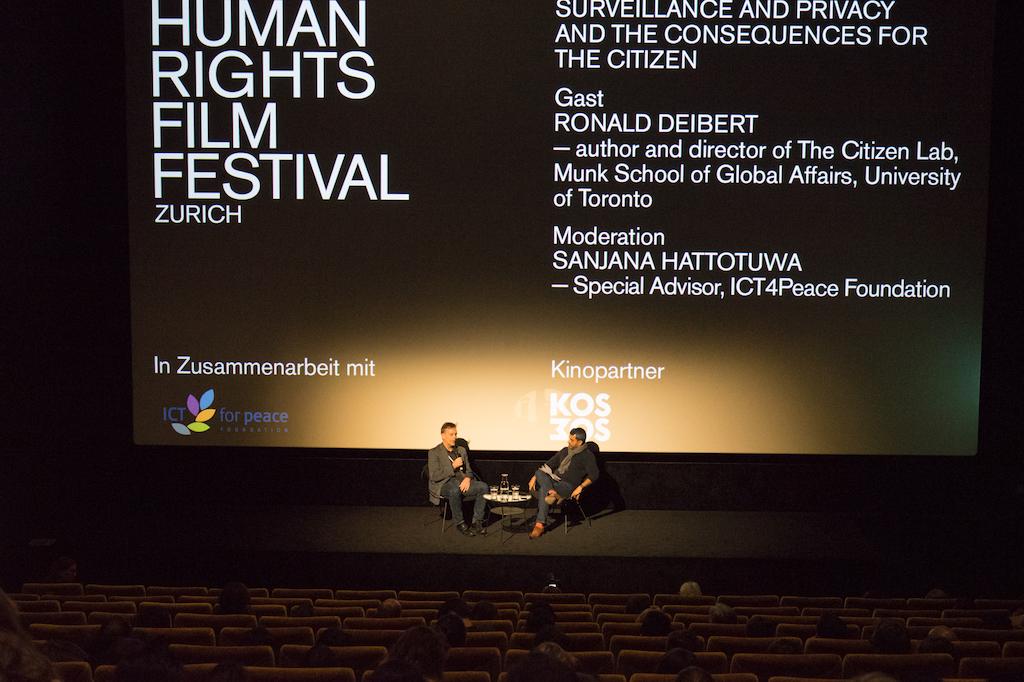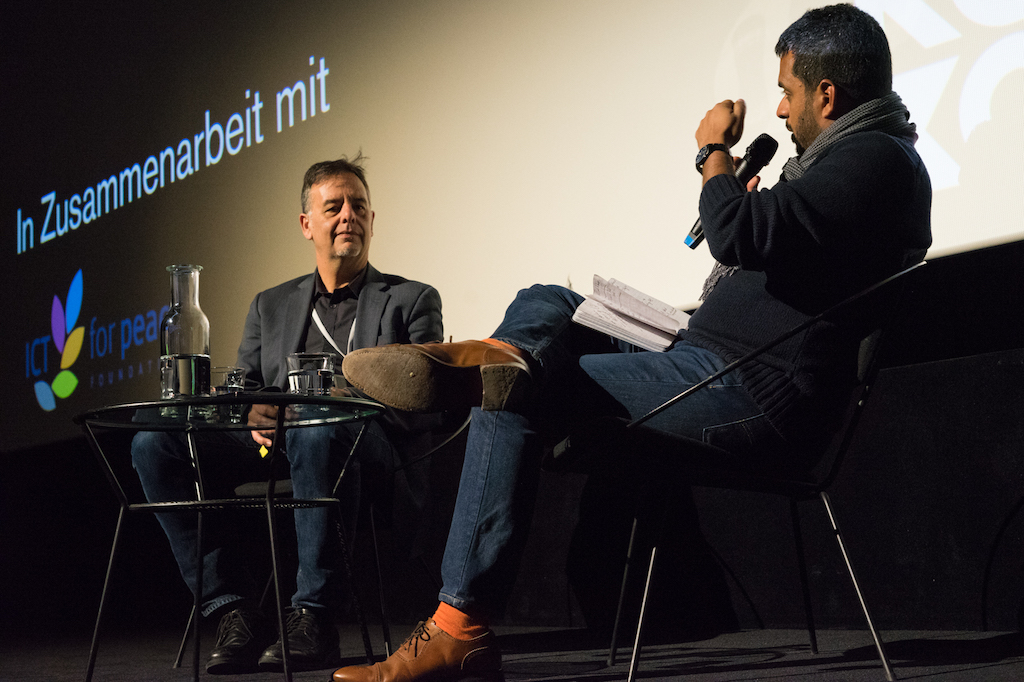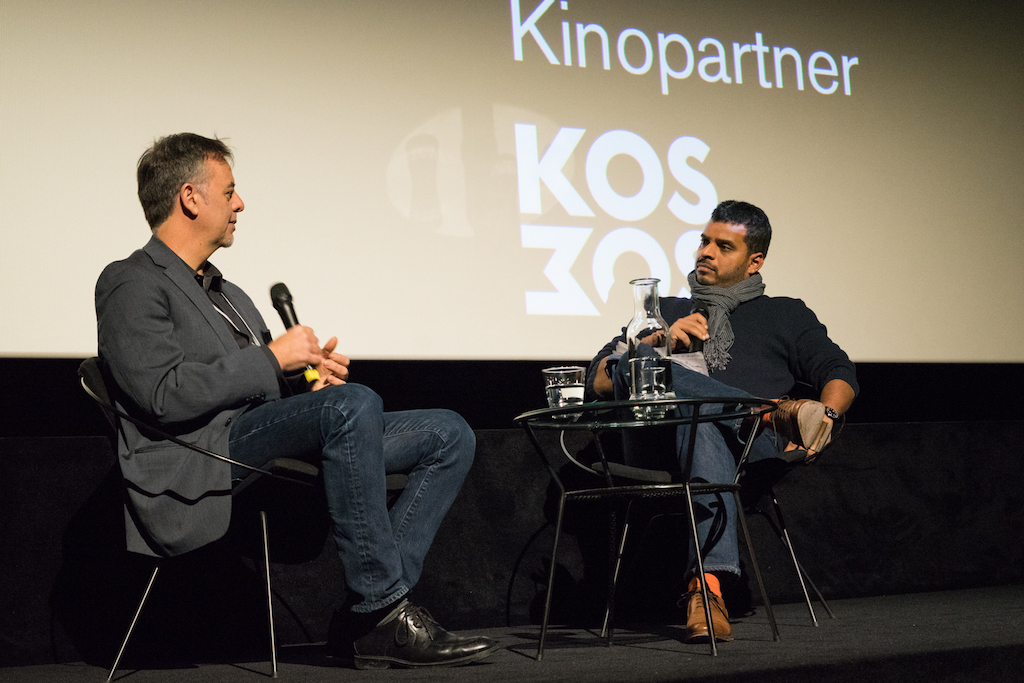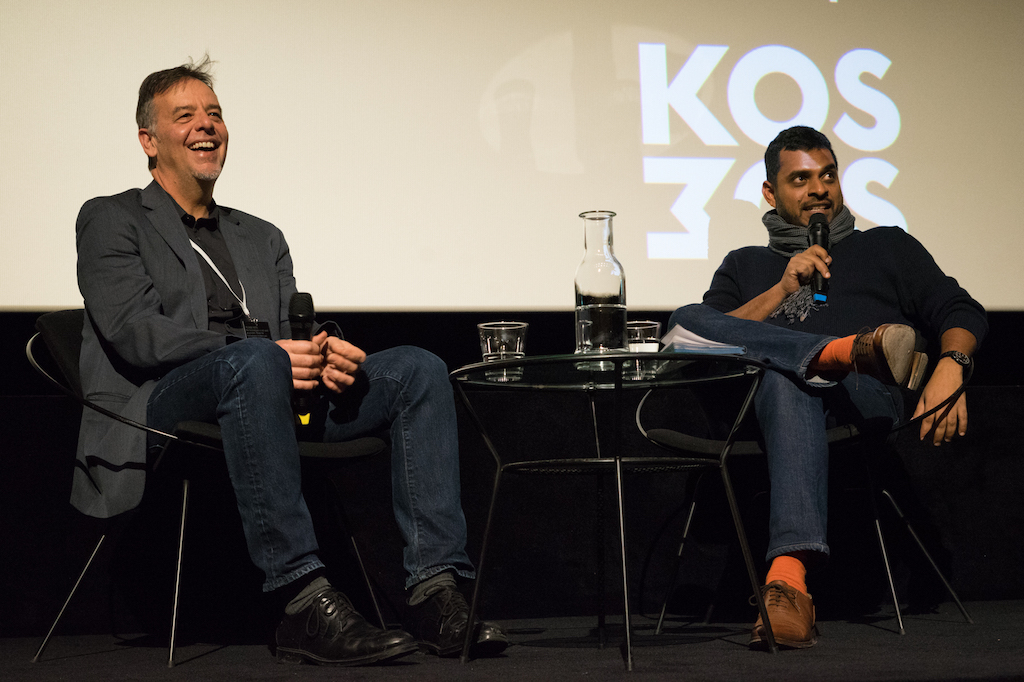As noted on its website, since 2015, the Human Rights Film Festival Zurich takes place each year on the occasion of the International Day of Human Rights on 10 December. The programme reflects a variety of human rights themes in different geographic and social contexts. The ICT4Peace Foundation has from the Festival’s inception, been an NGO partner. After screening The Look of Silence in 2016, after which a Skype video conversation was facilitated with the film’s director, Joshua Oppenheimer, the Foundation in 2017 screened the award-winning and critically acclaimed documentary, ‘Black Code‘.
The Foundation’s Special Advisor Sanjana Hattotuwa engaged in conversation with Prof. Ron Deibert, the Director of the Citizen Lab at the Munk School of Global Affairs, University of Toronto after the screening of the film.
We started the conversation around the film and its genesis, and moved swiftly on to how and if ordinary citizens, as a consequence of the work of Citizen Lab and others, post-Snowden in particular, feel any more empowered than before, or whether collectively, citizenry has given up on issues like privacy and in parallel, given into ubiquitous surveillance. We then go into how and if competencies and capabilities like that which the Citizen Lab offers by way of, inter alia, the rigorous study of surveillance and threats to privacy, is limited to the Global North, or if it also can and should be replicated in the Global South. The question was founded on problematising the fact that the key perpetrators undermining privacy and strengthening surveillance as well as the better angels, resisting this erosion and developing capacities amongst citizens to fight back and retain privacy, come primarily from the Global North, disempowering the Global South to be the architects of their own observation and pushback.
During the discussion, Prof. Deibert revealed to the audience the imminent launch of Security Planner, an innovative and powerful new tool and platform to help citizens understand better the nature of surveillance and what they could do to enhance privacy.
We go on to discuss how bad online surveillance really is, from the perspective of an ordinary citizen – noting that based on just ‘Black Code’, it is no longer possible to easily distinguish between what’s depicted in an Hollywood blockbuster like Jason Bourne, and the network surveillance technologies depicted there, and real life.
We then go on to talk about the role and nature of how social media, which in fact isn’t a central focus of ‘Black Code’ has over 2017 in particular become weaponised, and how social media companies today are inextricably entwined in webs of surveillance, misinformation, disinformation, rumour mongering, the gaming of election, referenda and all manner of other ways that are harmful to the health of society, and a democratic polity. Prof. Deibert is asked to comment on how in just a few years since ‘Black Code’, social media is now the tip of the spear in attacks against the fabric of democracy, in addition to that which is carried out by intelligence services, often in the name of national security.
Prof. Deibert is then asked, given the demonstrable lack of any rigorous oversight to the reach, role and relevance of intelligence services particular in the US, UK and other Five Eyes countries, what models and examples are there, if any, of how things can be done differently.
We go on to explore the classic ticking bomb scenario, which in this context is about the ability of law enforcement and intelligence authorities to determine threats to the health and safety of the general public in particular, and to public, critical infrastructure, democratic institutions or electoral processes. All of this requires a degree of surveillance that prima facie, runs counter to those who propose encryption, all the time, for everything, over all channels of communication. The contest and tension between these two sides of the debate is what Prof. Deibert is asked to comment on.
The conversation then proceeds to look at how Prof. Deibert manages his professional and personal life in the knowledge that as a consequence of what Citizen Lab does, and exposes, he and his team are under a very high degree of (network) surveillance. Prof. Deibert is asked how and if his life is any different to an ordinary citizen, because of what he does, speaks up against and stands up for.
Going back to ‘Black Code’, Sanjana notes that the second part of the film is anchored to an essential optimism around how the internet, by facilitating crowd-intelligence and sousveillance. Linking this to Prof. Deibert’s belief in the potential of the Internet to harness our better angels, the question is asked as to where this belief springs from, and why Prof. Deibert continues to believe in the power and potential of the Internet to empower citizens, and be a force for good.
The question time with the audience brought up the nature of patriarchy and gender based violence in the domain of cybersecurity, an issue that Citizen Lab and Prof. Deibert have had to deal with in the context of very serious and repeated allegations of rape and sexual assault by Morgan Marquis-Boire. Prof. Deibert in his response noted that this was the first time since he had issued his statement from Citizen Lab he had spoken publicly it. The ICT4Peace Foundation feels very strongly about the issue of sexual harassment and noted that it is a conversation that needs to be carried forward.
The rest of the questions dealt with China and its role in network surveillance, and what message Prof. Deibert had for students interested in learning about hacking for good, and more generally, around the use of technology for good and peaceful purposes.
The ICT4Peace Foundation was extremely privileged to have the opportunity to speak with Prof. Deibert, and indeed, screen ‘Black Code’ at the Zurich Human Rights Film Festival.
Watch the video of the conversation here. It is also embedded below.




